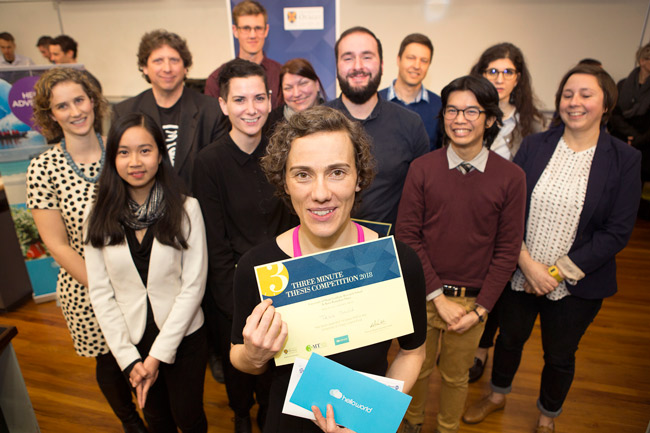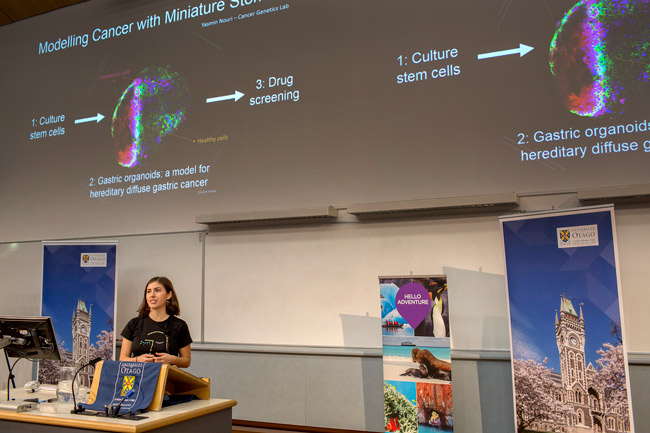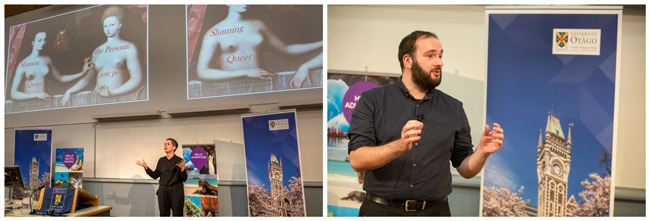
The winner of the PhD category of the University's Three Minute Thesis competition Tess Soulié with the other finalists after the competition on Friday night. Photos: Sharron Bennett.
A PhD candidate who is investigating the emotional responses of clinicians who deal with suicidal patients has won the PhD category of Otago's 2018 Three Minute Thesis (3MT) competition.
Tess Soulié is completing her PhD in Medicine at the University's Wellington campus on The therapeutic crafting of love: journey to the core of the clinical encounter with patients at risk for suicide, under the supervision of Professor Sunny Collings, Dr Elliot Bell and Dr Gabrielle Jenkin.
She took out the contest last Friday evening, beating six other PhD finalists from across the University's campuses and Divisions in the exciting event held at the Castle 2 Lecture Theatre and also live streamed.
“I am new to research and to this type of competition, so didn't expect to win,” she says. “It's extremely rewarding and motivating to be acknowledged and encouraged in your work by a jury of experienced researchers and academics.”
"For me it was about finding the balance between scientific rigour and presentation skills."
She describes the process of condensing her research into a three-minute, one slide presentation aimed at a non-specialist audience as “the ultimate task”.
“It is also a performance,” she says. “For me it was about finding the balance between scientific rigour and presentation skills.”
Tess became interested in the topic of suicide during the first year of her Master's in Clinical Psychology in France.
“As a future clinician, I anticipated that working with suicidal patients would be one of the most challenging endeavours. It turned out that this is how the majority of clinicians feel.”
She is interested in clinicians' emotional responses – also called 'countertransference' – to suicidal patients.
“Patients at risk for suicide tend to elicit intense and often negative countertransference. Clinicians need to manage these emotional responses to establish a fruitful therapeutic relationship with suicidal patients. On the other hand, clinicians' positive feelings of closeness and affiliation are associated with better outcomes in therapy.
“However, maybe because it is uncommon, this is rarely studied with patients at risk for suicide.”
In her PhD, Tess is addressing this knowledge gap by studying specifically the stance of clinicians who feel positively inclined, or 'like working' with suicidal patients.

Master's category winner Yasmin Nouri makes the most of the 180 seconds competitors have in which to describe their research.
The winner of the Master's category was Yasmin Nouri, who beat five other finalists to take this year's title.
She is conducting her research in Professor Parry Guilford's Cancer Genetics Lab – which is working to develop a chemopreventative treatment for Hereditary Diffuse Gastric Cancer (HDGC).
This aggressive form of stomach cancer, caused by a mutation in the E-cadherin gene, has a disproportionately high prevalence in the New Zealand Māori population – with the primary current treatment being the total removal of the stomach.
"I know that you don't have to be a scientist to be intrigued by the idea of mini organs being grown in a lab!"
“We are aiming to develop a low dose, low frequency treatment that will prevent mutation carriers from ever developing the cancer,” she says. “My specific role has been to help develop a new model for the disease, called a gastric organoid. This is a miniature stomach, which is grown by extracting stem cells from a mouse stomach and directing their growth into small, 3D stomach-like structures. I then mutate the E-cadherin gene to induce the cancer, so that the organoids reflect the stomach of an HDGC patient.”
These models are used to study disease mechanisms, as well as for drug screening.
“Using the organoids for drug screening allows us to identify compounds that kill cancerous cells that have had their E-cadherin gene mutated, but do not harm healthy cells - all in the context of a 3D stomach structure. Our most effective drug candidates will then be passed on to animal models and eventually human trials.”
She says while the science of her project is complex, and condensing it down to three minutes was tricky, she is lucky that the project is inherently engaging.
“I know that you don't have to be a scientist to be intrigued by the idea of mini organs being grown in a lab!”

The People's Choice winners, Emer Lyons (left) and Chris Kaldor.
The People's Choice winners were Emer Lyons in the PhD category, and Chris Kaldor in the Master's category.
"The quality of content and engagement we are seeing in the competition bodes extremely well for the contribution these talented researchers will continue to make..."
Emer is nine months into a PhD in English and Linguistics looking at the shaming of the personal in contemporary queer lyric poetry written by women in Ireland and New Zealand – and will submit both a poetry collection and a critical thesis. Chris is completing a Master of Science in Microbiology at the Christchurch campus, looking at the interaction of Neutrophil extracellular traps and the streptococcus pneumoniae bacteria.
One of the organisers of the competition, the Manager of Otago's Graduate Research School, Andrew Lonie says the 3MT, held annually as part of Otago's Graduate Research Festival, demonstrates the incredible breadth of research conducted at Otago, and shows that no matter how specialised that research is, it has relevance and appeal just waiting to be revealed.
“The quality of content and engagement we are seeing in the competition bodes extremely well for the contribution these talented researchers will continue to make – improving our societal conditions and understanding.”
Yasmin will go on to represent Otago at the 2018 Masters' 3MT Inter-University Challenge at the University of Canterbury later this month, while Tess will represent Otago at the 2018 Asia-Pacific 3MT Competition in Queensland in September.